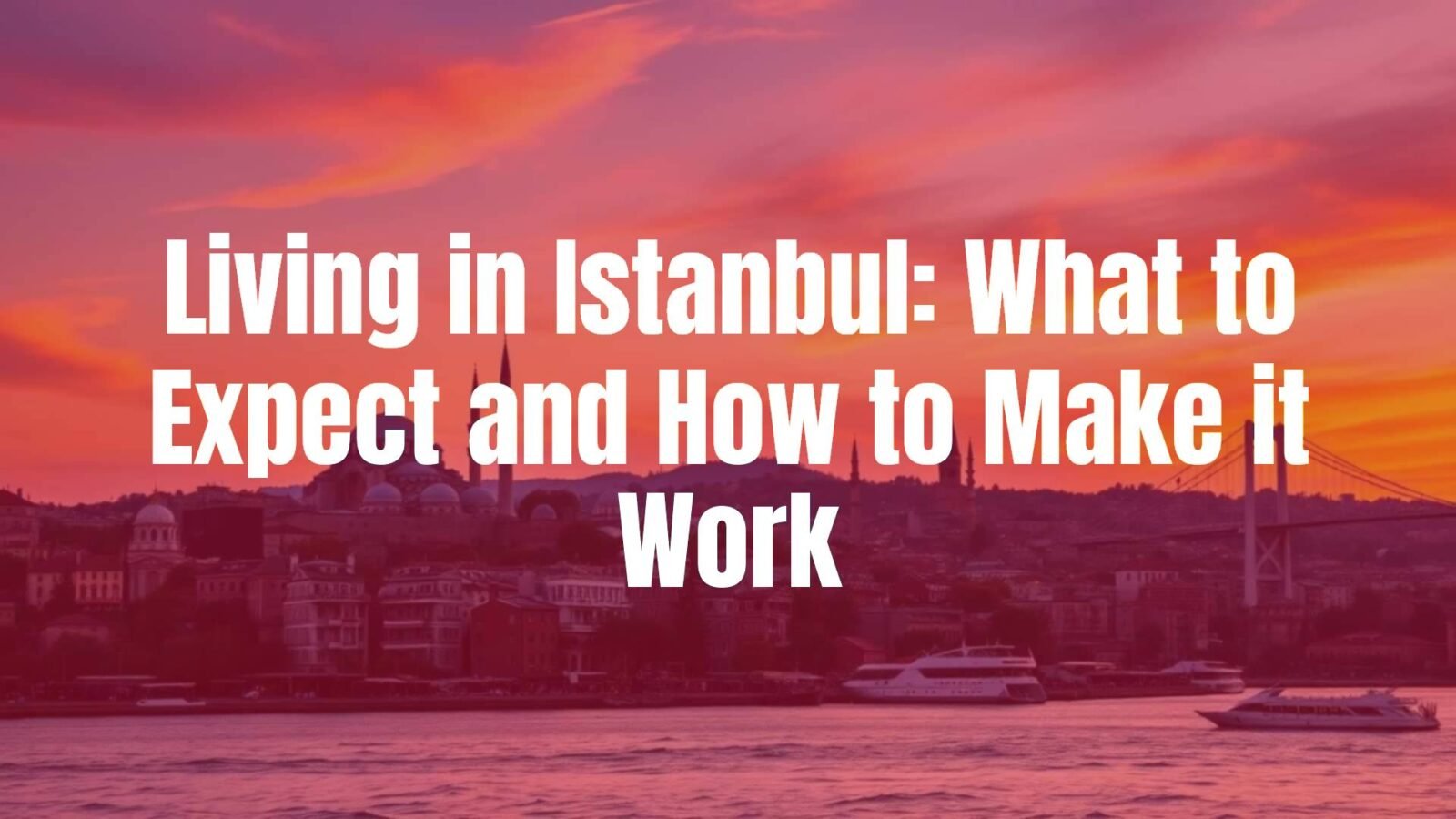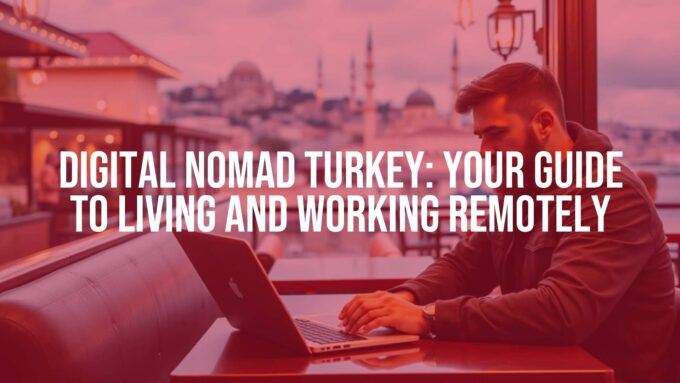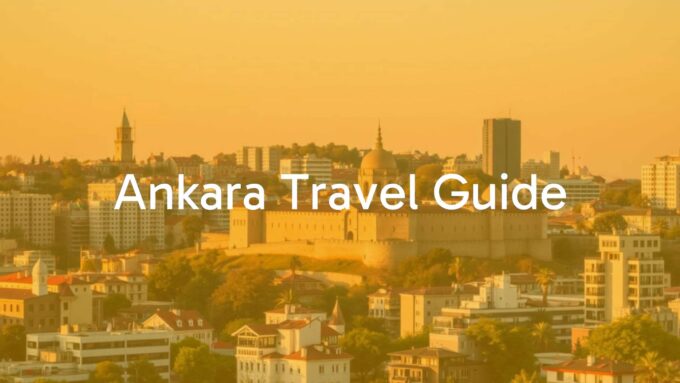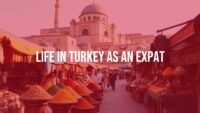Is Istanbul a good place to live? Definitely! Istanbul is a huge city that connects both Europe and Asia and offers a living experience that stands out. It’s a place with thousands of years of history, a lively culture, and many long-standing traditions. From famous sites such as the Blue Mosque and Hagia Sophia to crowded markets and the calm Bosphorus shoreline, Istanbul mixes its rich past with modern city life.
The city, once the capital of the Byzantine and Ottoman Empires, remains Turkey’s main center for business and culture. Its location makes it a great starting point for travel or work connecting Europe, the Middle East, and Central Asia. Whether you want new job opportunities, to experience a new culture, or are just drawn by the constant activity of this city, Istanbul promises an exciting and rewarding life for people from all backgrounds.

Living in Istanbul: What to Expect
Is Istanbul a Good Place to Live?
Istanbul is a city that, like many major cities, has both great benefits and some challenges. How much you enjoy it depends on what you want from a city and how comfortable your budget is. Some people find Istanbul to be a wonderful place to call home because of its energy, deep history, and cultural mix.
However, it’s a very large and busy city, home to around 20 million people. That means it’s loud, fast-moving, and not always spotless. This might be a lot for someone used to quieter places. Living costs have gone up too, mainly due to inflation. Still, for people earning foreign currencies or having a good income, Istanbul presents a high standard of living with many things to explore and enjoy.
What Makes Istanbul Special?
What sets Istanbul apart most is its spot as the only city in the world that sits on two continents-Europe and Asia. Bridges, tunnels, and ferries cross the Bosphorus, and this mix isn’t just about land, it’s also about cultures. The city brings together both Eastern and Western ideas, with old traditions mixing with new trends.
Aside from geography, Istanbul is filled with historic places like the Blue Mosque, Hagia Sophia, and the Grand Bazaar. It feels like an open-air museum, showing off Greek, Roman, Byzantine, and Ottoman roots. You’ll see busy modern life with arts, restaurants, and nightlife right next to ancient sites. The city’s neighborhoods-some by the peaceful Bosphorus, others on hills-give Istanbul its special character, making life full of surprises.
Istanbul’s Multicultural Vibe
Istanbul lets people from all over the world and all across Turkey live together, making it very mixed and open. This diversity means that the city does not have just one culture but is home to many languages, ways of living, and backgrounds.
As a foreigner, this mix usually makes it easier to fit in. People here are used to meeting people from everywhere, so it’s not too hard to find friends or your social group. While there are more traditional parts of the city, many areas are modern and welcoming-similar in style to European capitals. So whether you want to meet locals or connect with other expats, there’s a place for everyone in Istanbul.
Everyday Life in Istanbul
Daily life here is busy and exciting, a lot like other big cities in the world but with Turkey’s own special touch. The city feels alive from early in the morning, with the call to prayer, until late at night in entertainment spots. Still, the pace can slow down in certain areas-places like Cihangir or Arnavutkoy are more peaceful, often chosen by artists and remote workers, whereas Kadikoy or Besiktas are always bustling.
Getting around can sometimes be tough because of heavy traffic. But the city has many forms of public transport to help you get from one place to another. Whether you’re discovering local hidden spots, enjoying traditional food, or relaxing over tea, Istanbul is full of life and discovery.

Pros and Cons of Living in Istanbul
Good Points of Life in Istanbul
- Location: Istanbul is close to Europe and Asia, making travel easy and often affordable.
- Culture: The city is like a museum with its historic sites, museums, art, and food.
- Weather: Istanbul mostly enjoys sunny, warm seasons with mild autumns and springs.
- People: Locals are generally friendly and helpful, making it easier for newcomers to settle down.
- Opportunities: The expanding job market provides possibilities, especially in business, tourism, and tech.
Downsides and Challenges
- Crowds: Istanbul is very crowded, and this leads to frequent traffic jams and long commutes.
- Cost: Prices have gone up in recent years, especially for housing and imported goods.
- Language: English is not spoken everywhere; in some places, Turkish is the only language you’ll hear.
- Mixed Quality: Some neighborhoods are less safe or clean, and air pollution and smoking are often mentioned by residents.
Cost of Living in Istanbul
Living in Istanbul can still be cheaper than in many Western cities, even if it isn’t as affordable as it used to be. Inflation has pushed prices up, but people earning foreign currency still find their money goes further here compared to cities like London or New York.
For one person to live comfortably, about 50,000-60,000 Turkish lira a month (roughly $1500-$2000, as of early 2024) is usually enough. A couple should expect to spend around $3000 per month. Most of this will go to rent, with utilities, groceries, and transport as other main costs. Planning your expenses is important before moving.
Housing and Rent
Housing has gotten much more expensive, especially in the city center. Your rent depends on the area, building age, whether it’s near a metro line or the Bosphorus, and if the apartment comes furnished (most do not). Using a broker/agent will also add about 10% of yearly rent as a fee.
| Area | Monthly Rent (1+1) | Monthly Rent (2+1 Elite) |
|---|---|---|
| Beyoğlu, Beşiktaş, Şişli, Kadıköy | 20,000 TL ($678) | 60,000 TL ($2000+) |
| Beylikdüzü (Outer areas) | 10,000 TL ($340 for 2+1) | – |
Most places are unfurnished; landlords expect 1-2 months’ deposit in advance, plus the first month’s rent. Furnished places are costlier and found mainly in tourist spots.
Monthly Utilities and General Expenses
Utilities like electricity, heating, and water for an average apartment (85m²) cost about €43-€58 (1,500-2,000 TL) a month. Old buildings can be colder and may mean higher heating bills in winter. Internet and phone service is reasonable, especially with longer contracts.
Other costs like food, travel, and entertainment vary, but a single person should budget around €740-€930 a month for everything but rent. Taxes on luxury and imported goods are high, which makes some products pricier. Buying local keeps costs much lower.
Food Costs
Food prices depend on what and where you buy. Supermarkets like Migros are common, but street markets usually have the cheapest and freshest options.
| Item | Price (TRY/USD) |
|---|---|
| Bread | 8 TRY ($0.27) |
| 15 eggs | 64 TRY ($2.17) |
| 1 liter milk | 24 TRY ($0.81) |
| Potatoes (per kg) | 20 TRY ($0.68) |
| Beef (per kg) | 500 TRY ($16.96) |
Local food is cheaper; imported goods, pork, and alcohol cost much more due to higher taxes. Shopping at markets and learning simple Turkish for shopping can help you save.

Transportation Costs
Istanbul’s public transport-including buses, trams, ferries, and subways-is large, reliable, and affordable. The best option is to use an Istanbul Kart, a refillable travel card good on all public transit. A monthly travel pass is about €29 (990 TL).
- The city is walkable in some areas, but distances can be long.
- Ferries offer scenic rides, especially between continents.
- Taxis are available but can get stuck in traffic and cost more.
Use public transport when possible to keep travel expenses low.
Medical Care and Insurance
Istanbul has both public and private hospitals, with highly-trained staff and modern equipment. Many come to Istanbul for medical care as it’s known for quality and lower costs compared to the West.
- Public healthcare needs registration with the government (SGK)-done through a job or separately.
- Many expats prefer private hospitals for shorter waits and English-speaking doctors.
- Health insurance is required for most foreigners seeking a residence permit.
- Pharmacies (“eczane”) are everywhere and offer basic advice and affordable prices.
In emergencies, call 112 for an ambulance-service is fast and reliable.
Istanbul vs. Other World Cities
Compared to cities like London, Paris, or New York, living in Istanbul usually costs less. Essentials like food, transport, and going out remain more affordable, though prices are rising.
Imported or luxury items and alcohol are costly because of taxes. While further neighborhoods are cheaper, they might mean longer rides due to heavy traffic. Overall, Istanbul’s mix of culture, history, and better value for money makes it a good choice for many people, especially those earning foreign money.
Best Places to Live in Istanbul
Istanbul has 39 districts, each unique with its own style and feel. Where you live will change your daily life a lot, so picking the right neighborhood is very important. You’ll find everything from bustling city centers to calm, family-friendly areas or lively neighborhoods popular with artists.
Whether you prefer the European or Asian side of the city, both areas offer different benefits-from active city life and history to quiet spaces and a slower pace. Knowing the differences will help you choose your ideal place to live.
European vs. Asian Side
- European Side: Busy, with major business centers, famous landmarks, nightlife, and sought-after spots like Beşiktaş, Şişli, and Nişantaşı. Prices and traffic are higher here.
- Asian Side: More relaxed and quieter. Areas like Kadıköy and Üsküdar are safer, have larger homes for less money, and offer a friendly vibe, with easy ferry rides to the European side.

Whether you want fast city action or a more relaxed life, both sides have neighborhoods to match your lifestyle and budget.
Popular Areas for Expats
- Beyoğlu (Cihangir, Galata): Great for creatives, full of cafes, bars, and historic spots. Many foreigners call this area home.
- Beşiktaş, Şişli, Nişantaşı: Popular for young professionals, high-end shopping, dining, and modern apartments.
- Kadıköy (Asian side): Laid-back with an artistic spirit, excellent value, and strong expat presence.
Each district offers a different balance of community, entertainment, and convenience, depending on what matters most to you.
Best Neighborhoods for Families
- Üsküdar (Asian side): Historic, peaceful, and safe with great Bosphorus views.
- Kadıköy: Some neighborhoods are especially good for families, with parks and a slower pace.
- Bahçeşehir, Arnavutköy (European side): Leafier, with a more suburban feel, and good for those wanting space and quiet.
Family-friendly areas focus on calm, community, green spaces, and good schools, though often further away from central tourist spots.
Trendy, Creative Spots
- Cihangir (European side): Artistic and bohemian, full of cafes and lively streets.
- Galata, Karaköy: Mix of history, art galleries, and a vibrant night scene.
- Kadıköy (Asian side): Top pick for young, creative people looking for an alternative, lively setting with lots of culture.
Finding a Place to Live in Istanbul
Looking for housing in Istanbul takes planning. Many types of homes are available, but you should always check them in person because online photos can be misleading. It’s a good idea to book a short-term place while you look for a long-term home so you can get to know different neighborhoods.
The rental market changes quickly, so have your paperwork ready and know what is needed to rent or buy a place.
Renting: Steps and What You Need
- Valid passport
- Turkish tax number
- Proof of income
- Landlords usually ask for 1-2 months’ deposit and the first month’s rent upfront.
Rental contracts are mostly in Turkish. Getting help from a bilingual agent or a local is a good idea. Agencies charge about 10% of a year’s rent as commission. You’ll also need a residence permit for most long-term rentals.
Sites like Sahibinden, Emlakjet, and HepsiEmlak are useful for property searches. Expats also use Facebook or WhatsApp groups to find rentals.
Buying a Home as a Foreigner
- Foreigners can buy property without needing a prior visa or residency permit.
- Process involves: getting a foreigner ID, opening a Turkish bank account, checking the property’s documents, and signing official papers at the land office (“Tapu”).
- If you buy a property worth $400,000 or more, you may qualify for Turkish citizenship-a process that takes a few months.
Tips for Affordable Housing
- Look further from the center-prices drop as you move away from tourist districts.
- The Asian side and outer districts usually offer bigger places for less money.
- Stick to local shopping and markets to save on daily costs.
- Use social media and local sites to find better deals, plus try bargaining, especially with private landlords.
- Having a residence permit opens up more options and can help you avoid expensive short-term rentals.
Visa and Residence
If you want to stay long-term, you must understand Turkish visas and residence permits. Turkey isn’t in the Schengen Area but offers several legal routes for foreigners, including tourists, students, workers, or investors. The process isn’t complicated but does require paperwork and visits to official offices.
You can usually enter on a tourist visa, but to live in Istanbul, you must apply for a residence permit matching the reason for your stay: leisure, work, study, or investment. Knowing the process ahead of time will help everything go smoother.
Tourist Visa Basics
- Most people can stay up to 90 days within a 180-day period on a tourist visa. Some nationalities need only their passport for visits up to 90 days.
- Others can get an e-visa online.
- You need a passport valid for 6 months beyond your trip, a filled-out application, proof of where you’ll stay, return travel, and enough money.
- You can’t work or extend a tourist visa from inside Turkey.
Residence Permits: Short and Long-Term
- Short-term: Usually for one year, for tourists or digital nomads. Requires health insurance, proof of address, financial means, and a valid passport.
- Long-term: For those who lived in Turkey 8 years or longer. Needs steady income, no need-based aid in past 3 years, health coverage, and a clean record.
Applying is mostly online, followed by an appointment. The answer comes in up to 90 days. During the wait, you usually can’t leave Turkey except for emergencies.
Permits for Work and Study
- A job offer is needed; employers usually apply for your work permit.
- Some jobs (health, law, security, guiding tours) are closed to foreigners.
- Work permits are for a year with possible renewals; rules require companies to hire a certain number of Turkish employees per foreign worker.
- Student permits require enrollment proof and health insurance. They don’t automatically allow work, and most students do part-time or online jobs. There’s no specific “digital nomad” visa at this time.
Getting Around and Daily Tasks in Istanbul
Daily life in Istanbul is a mix of old customs and modern services. Getting groceries, using public services, and finding your way around might take some getting used to, but with a bit of time, it becomes routine.
The city can feel chaotic but has enough organization to make things easier once you figure out how it works. Adapting to everyday customs, like bargaining or using local transport, will help you enjoy life here.
Public Transport Details
- There are metros, trams, buses, minibuses, and ferries to connect all parts of the city.
- Istanbul Kart makes travel simple on all lines and is cheaper than buying single tickets.
- The metro, trams, and buses go to most places, especially with new lines opening up.
- Ferries are great for traveling between European and Asian sides, with main ports at Üsküdar, Kadıköy (Asian), and Eminönü (European).
Getting to Work: Commuting Tips
- Traffic jams are common. Avoid driving during rush hours if you can.
- Use the metro and ferries for a faster ride and to avoid road delays.
- Dolmuş (shared minibuses) are cheap and good for short trips but can be crowded.
- Apps with live traffic updates help if you drive.
- Living near work or a main transport line makes commutes much more manageable.
Where to Shop
- Supermarkets are everywhere, but local street markets are often cheaper for fresh food.
- Learning a few Turkish words helps with shopping and getting better deals, especially when bargaining in bazaars.
- If you want big shopping centers with brands and designer shops, places like Nişantaşı provide that.
- The Grand Bazaar and Spice Bazaar are famous stops for unique local goods.
Medical Services and Pharmacies
- Both public and private hospitals have English-speaking staff, especially in bigger clinics.
- Pharmacies (“eczane”) are open 10 am-7 pm most days. For late-night needs, there’s always an emergency pharmacy available, with a schedule posted on doors or online.
- Always keep your ID and permit ready when going to a hospital.
If There’s an Emergency
- Dial 112 for ambulances and urgent medical help-this number works everywhere.
- Have your address and personal details handy for faster service.
- Private hospitals are quicker and more comfortable, but public ones are also reliable.
Culture and Language in Istanbul
Istanbul’s culture is a mix of east and west, which comes through in customs, food, and daily routines. While Turkish is the main language, you’ll find some areas where English is common, especially downtown or near tourist spots.
Trying to learn Turkish, even just some simple words, will make life much easier and open more doors for connections with locals.
Getting Used to Turkish Ways
- People in Istanbul are generally welcoming and interested in helping newcomers.
- You’ll often be offered tea in shops-it’s polite to agree.
- Show respect by greeting people with titles like “abi” or “abla” for older men and women.
- Dress modestly in less touristy or more traditional neighborhoods, especially for women.
- Bargaining is expected in markets and sometimes even when renting homes.
- The call to prayer is a regular background sound, especially in older districts.
Is English Enough?
In tourist areas and among younger people, you’ll get by with English. Hotels, busy restaurants, and international businesses often have staff who can talk to you in English. Outside these areas, Turkish is the main language, so you might run into challenges with government paperwork or in smaller shops.
Learning common Turkish words or using translation apps can help you get around any language barriers and build good relationships with your neighbors.
Important Turkish Phrases
- Merhaba (Hello)
- Günaydın (Good morning)
- İyi akşamlar (Good evening)
- Lütfen (Please)
- Teşekkür ederim (Thank you)
- Ne kadar? (How much?)
- İndirim var mı? (Is there a discount?)
- Nerede? (Where is…?)
Language apps like Duolingo or Babbel, and platforms like iTalki, are great for getting started. Even a few words are appreciated. Locals love it when you try!
Jobs and Schools in Istanbul
Istanbul is Turkey’s main city for business, work, and education. Its location brings professionals and students from all over. It’s important to know how the job market, workplace culture, and education system work before you move.
Finding Work
- English teaching jobs are popular with foreigners, and there’s good demand for certified teachers (TEFL/CELTA).
- Other fields include business, tourism, and IT, especially with foreign companies or jobs that require English skills.
- Some fields, like healthcare, law, and security, are off-limits for foreigners.
- If you get paid in foreign currency, your money will go further due to the exchange rate.
Workplace Culture
- Offices can be formal with clear structure; relationships matter, and socializing at work is important.
- Being on time is good, but some workplaces run on flexible “Turkish time.”
- Personal connections help you find better jobs or deals.
- Shared meals or tea breaks help you bond with colleagues.
Schools and Universities
- 61 universities and over 185,000 international students make Istanbul a great place for study abroad.
- Costs for both university and living are usually lower than in the US or Europe.
- Many international schools and English-taught college programs are available.
- Language can be a challenge outside school, but students are usually supported by their schools or programs.
Safety in Istanbul
How safe is it to live in Istanbul? In general, the city is quite safe, with low crime rates compared to similar big cities worldwide. The police presence is strong, and most neighborhoods are peaceful, though you should always be careful in crowded areas.
Petty crime, like pickpocketing, can happen in big markets and tourist zones, but violent crime is rare. ID checks by police are common at night for added security. Many expats find Istanbul to be as safe or safer than other large cities they’ve lived in.
Women’s and Family Safety
- Women generally feel safe, especially in central and upscale districts. Dressing as you prefer is accepted in most areas, though modest clothes are a good idea in traditional spots.
- Families often choose quieter, greener districts away from the center and say they feel their children are safe.
- Women-only areas are available in gyms, public transport, and some baths for privacy.
The Expat Community in Istanbul
Istanbul is home to many expats from all over the world. This community is supportive and active, making starting a new life in Istanbul much easier. It is easy to find groups for socializing, advice, or just fun together.
Making Friends
It’s not hard to make friends here. Expat groups are welcoming, and it’s common for strangers to start up friendly chats. You can find both locals and foreigners to build a good social life, using foreigner meetups, language exchanges, or just going to local coffee shops and events.
Clubs and Expat Groups
- Facebook has many active groups for expats-good for getting help and finding events.
- Clubs focused on sports, art, travel, or food are common, often open to foreigners.
- International schools and cultural centers hold regular events to help people meet up.
Common Questions About Living in Istanbul
Can Americans Live in Istanbul?
Yes, Americans can live and work in Istanbul. There is a strong American expat community here. After entering as a tourist, many Americans apply for residence or work permits to stay long-term.
Cost of living is usually much lower than in the US, and learning some Turkish will make life easier and more enjoyable.
Can Foreigners Own Property?
Yes, anyone can buy a home in Istanbul. You don’t need a residency permit first. Buying property as a foreigner is straightforward, involving getting an ID number, opening a Turkish bank account, checking property paperwork, and registering at the local land office.
Spending at least $400,000 gets you access to apply for Turkish citizenship within a few months.
Is Istanbul Good for Retirement?
More and more people pick Istanbul for retirement. You get more for your money, especially on essentials like housing, food, and health care. The city’s weather is pleasant much of the year, and its culture means there’s always something fun to do. There are also quieter neighborhoods that are better suited for a slower day-to-day pace.
How Do Living Costs Compare to the US or UK?
| Area | Monthly Living Cost (excl. rent) | Remarks |
|---|---|---|
| Istanbul | $1500-2000 | Comfortable living, price depends on lifestyle |
| London/New York | Much higher | Often not enough even just for rent |
Daily costs like rent, utilities, and food are much cheaper in Istanbul. Imported items and alcohol, because of high taxes, can be expensive though, so keep that in mind. If you earn foreign currency, the exchange rate makes life here even more affordable.














Leave a comment